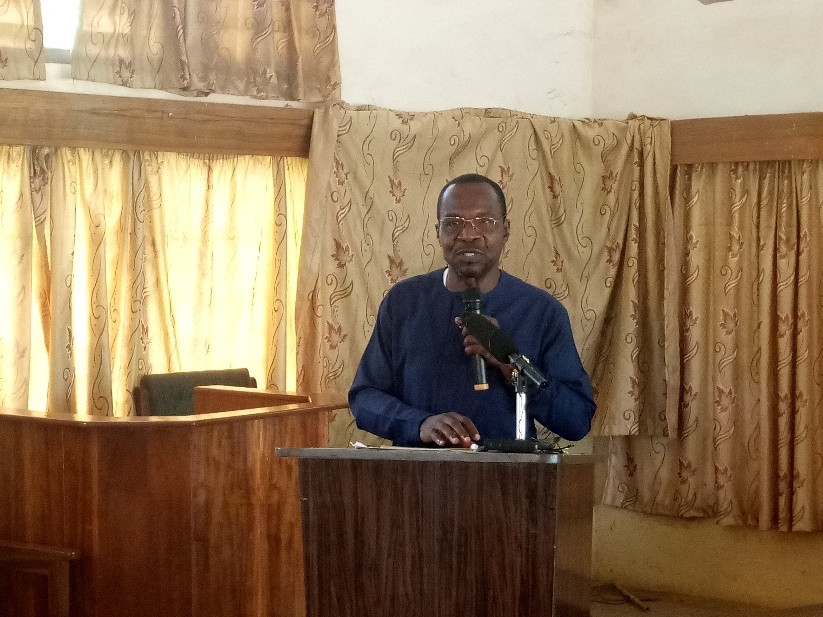PIAC schools stakeholders in Bongo on petroleum revenue

The Public Interest and Accountability Committee (PIAC) has schooled stakeholders in the Bongo District of the Upper East Region on Ghana’s petroleum revenue and its funded projects over the past seven years.
The 13-member committee, made up of members from professional, pressure, traditional and religious groups had been on a week long facts finding visit to inspect projects funded from the oil revenue, and to sensitize stakeholders on the use of same in the region.
Addressing the stakeholders, Mr Affail Monney, President of the Ghana Journalists Association (GJA) and member of PIAC, said “we are here basically to let you know how much has been accrued from oil production, how the money has been spent, who has received what and to hear from you how best to police and use our oil resources.”
Mr Monney who recounted mining activities in Ghana over the past 100 years, said PIAC was not in existence and accountability was non-existent, “so it was free for all, the white men will mine our gold, leave our shores and go outside and sell,” he said, adding that, citizens did not have the voice and the courage to question colonial masters.
He said there was “naked exploitation and thievery of our mining resources” to the extent that mining towns and cities in Ghana could not be compared to those in other countries like South Africa.
The GJA President said “as our name indicates, public interest is of first importance in what we do. We have been established to cater for our interests.
“The establishment of PIAC was prompted by the need to right historical and economic wrongs and to ensure that the public interest is upheld at all times.”
Mr Monney emphasized that “PIAC represents your interest, and under no circumstance shall we sacrifice your interest on the altar of all the oil in Ghana,” and indicated that it was the responsibility of PIAC to hold all players in the oil industry to account for work done, and to render same to the public.
Dr Thomas Kojo Stephens, Vice Chairman of PIAC who took stakeholders through the annual crude oil production from 2010 to 2017, indicated that 1,181,088 million barrels of oil was produced in 2010, 24, 195,895 million in 2011, 26,351,278 million in 2012, 35,587,558 in 2013, 37,201,691 million in 2014 and 2015, 37,411,651 million barrels were produced.
He indicated that between 2010 and 2015, all the oil produced was from the Jubilee Oil Field, until 2016 when the TEN Field started producing, “so when we got to 2016 we had two fields producing; the Jubilee Field and the TEN Field. The Jubilee Field produced 26,981,640 million barrels, and the TEN Field produced 5,316,998 million barrels.”
Dr Stephens who is also a representative of the Ghana Bar Association (GBA) on PIAC, said in 2017, a third oil field known as the Sankofa Gye Nyame (SGN) was added, and it produced 5,455,512 million barrels of oil, while the Jubilee Oil Field produced 32,749,975, and TEN produced 20,452,577.
He explained that the dip in production in 2016 was because there was a problem with the Floating Production Storage and Offloading (FPSO) vessel, “our production had to reduce, we were not producing as much in 2016 because of the problem we were having with the FPSO. In 2016 the Jubilee Field did not produce as much as it would otherwise have produced. We were lucky because during this period the TEN Field also started producing,” he said.
The Vice Chairman said the 1,181,088 million barrels produced in 2010 was production for only December 2010, “the other figures that you see there, is for the full year, but you only see 1,181,088 because it is just for one month.
“So the total number of barrels that we produced from 2010 to 2017 is 253,085,873 million barrels of oil.”
Dr Stephens said Ghana made $ 4.009 billion from oil production from 2011 to 2017 and noted that the Petroleum Revenue Management Act 815 stipulates how government should use the oil money. “So if government uses the money in any other way that the law stipulates, then the government is in breach of the law. That is one of the things PIAC does. PIAC is supposed to monitor and ensure that government uses the oil revenue in accordance with the law.”
Source: GNA
